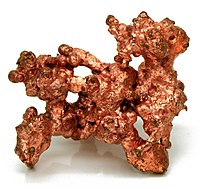
Photo from wikipedia
Multi-drug resistant Staphylococcus aureus, including methicillin-resistant S. aureus (MRSA), has become a worldwide, major health care problem. While initially restricted to clinical settings, drug resistant S. aureus is now one… Click to show full abstract
Multi-drug resistant Staphylococcus aureus, including methicillin-resistant S. aureus (MRSA), has become a worldwide, major health care problem. While initially restricted to clinical settings, drug resistant S. aureus is now one of the key causative agents of community-acquired infections. We have previously demonstrated that copper dependent inhibitors (CDIs), a class of antibiotics that are only active in the presence of copper ions, are effective bactericidal agents against MRSA. A second-generation CDI, APT-6K, exerted bactericidal activity at nanomolar concentrations. At sub-bactericidal concentrations, it effectively synergized with ampicillin to reverse drug resistance in multiple MRSA strains. APT-6K had a favorable therapeutic index when tested on eukaryotic cells (TI: > 30) and, unlike some previously reported CDIs, did not affect mitochondrial activity. These results further establish inhibitors that are activated by the binding of transition metal ions as a promising class of antibiotics, and for the first time, describe their ability to reverse existing drug resistance against clinically relevant antibiotics.
Journal Title: Scientific Reports
Year Published: 2020
Link to full text (if available)
Share on Social Media: Sign Up to like & get
recommendations!